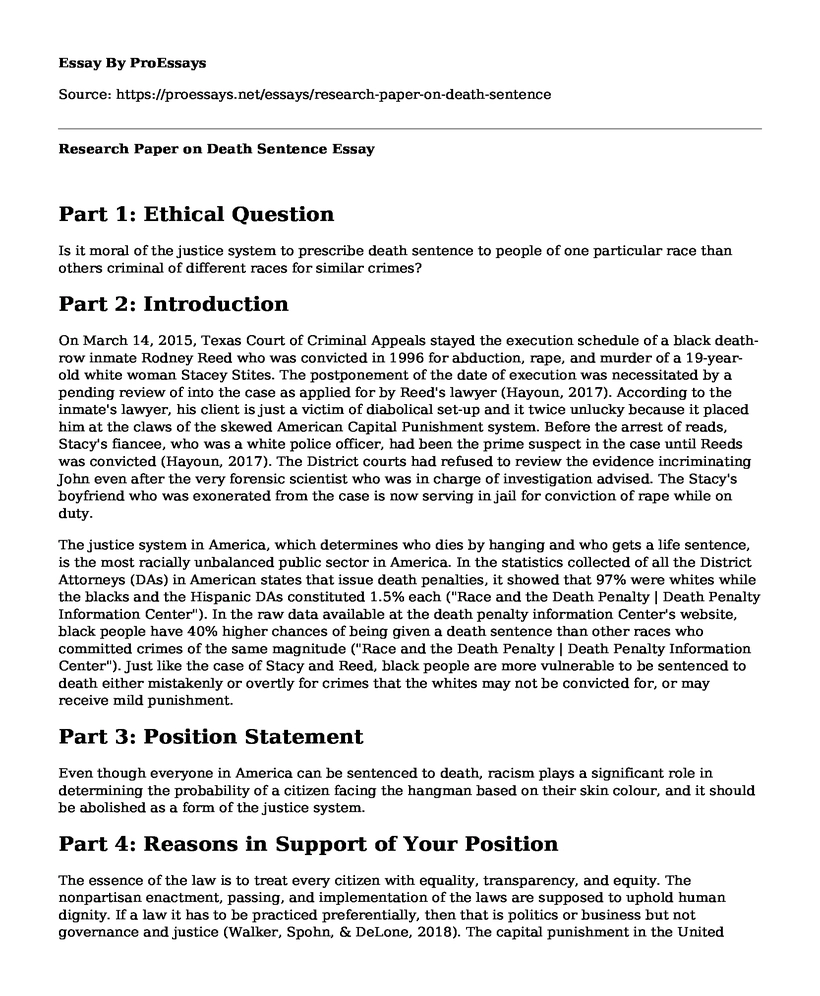Part 1: Ethical Question
Is it moral of the justice system to prescribe death sentence to people of one particular race than others criminal of different races for similar crimes?
Part 2: Introduction
On March 14, 2015, Texas Court of Criminal Appeals stayed the execution schedule of a black death-row inmate Rodney Reed who was convicted in 1996 for abduction, rape, and murder of a 19-year-old white woman Stacey Stites. The postponement of the date of execution was necessitated by a pending review of into the case as applied for by Reed's lawyer (Hayoun, 2017). According to the inmate's lawyer, his client is just a victim of diabolical set-up and it twice unlucky because it placed him at the claws of the skewed American Capital Punishment system. Before the arrest of reads, Stacy's fiancee, who was a white police officer, had been the prime suspect in the case until Reeds was convicted (Hayoun, 2017). The District courts had refused to review the evidence incriminating John even after the very forensic scientist who was in charge of investigation advised. The Stacy's boyfriend who was exonerated from the case is now serving in jail for conviction of rape while on duty.
The justice system in America, which determines who dies by hanging and who gets a life sentence, is the most racially unbalanced public sector in America. In the statistics collected of all the District Attorneys (DAs) in American states that issue death penalties, it showed that 97% were whites while the blacks and the Hispanic DAs constituted 1.5% each ("Race and the Death Penalty | Death Penalty Information Center"). In the raw data available at the death penalty information Center's website, black people have 40% higher chances of being given a death sentence than other races who committed crimes of the same magnitude ("Race and the Death Penalty | Death Penalty Information Center"). Just like the case of Stacy and Reed, black people are more vulnerable to be sentenced to death either mistakenly or overtly for crimes that the whites may not be convicted for, or may receive mild punishment.
Part 3: Position Statement
Even though everyone in America can be sentenced to death, racism plays a significant role in determining the probability of a citizen facing the hangman based on their skin colour, and it should be abolished as a form of the justice system.
Part 4: Reasons in Support of Your Position
The essence of the law is to treat every citizen with equality, transparency, and equity. The nonpartisan enactment, passing, and implementation of the laws are supposed to uphold human dignity. If a law it has to be practiced preferentially, then that is politics or business but not governance and justice (Walker, Spohn, & DeLone, 2018). The capital punishment in the United States has proven to be tilted to serve the interest of a section of the population as it profiles other sections, watering down its sanctity. It must, therefore, be banned for its unconstitutionality.
Part 5: Opposing Position Statement
The interpretation of the law is a prerogative of the judicial system, and how fair the justice system is cannot be quantified and determined by the statistical distribution of phenomena, therefore, the law is taking its course effectively, and capital punishment is justified.
Part 6: Reasons in Support of the Opposing Position
The judges go through a series of listening and situational analyses to make a final judgment. There are legal cases reviews in which the files of judges are analyzed to determine if the judgments made are biased or not. Judges are never found culpable of racial profiling in the courts. Again, there is no logic for the outcry that the distributions of the judicial judgments do not reflect the racial divides in the nation as expected (Levan, 2018). Crime is a personal decision, and everyone is death with as an individual, it is therefore unwise to expect races to have a specific percentage of people in jail or the death row.
References
The Death Penalty in Black and White: Who Lives, Who Dies, Who Decides | Death Penalty Information Center. (n.d.). Retrieved from https://deathpenaltyinfo.org/death-penalty-black-and-white-who-lives-who-dies-who-decides
Hayoun, M. (2017, April 9). The struggle against America's racist death row. Retrieved from https://www.aljazeera.com/indepth/features/2017/04/struggle-america-racist-death-row-170409094601240.html
Levan, K. (2018). Irreversible Punishment: Teaching About Inequalities in Capital Punishment. Teaching Economic Inequality and Capitalism in Contemporary America, 221-232. doi:10.1007/978-3-319-71141-6_19\
Walker, S., Spohn, C., & DeLone, M. (2018). The color of justice: Race, ethnicity, and crime in America.
Cite this page
Research Paper on Death Sentence . (2022, Jul 01). Retrieved from https://proessays.net/essays/research-paper-on-death-sentence
If you are the original author of this essay and no longer wish to have it published on the ProEssays website, please click below to request its removal:
- Case Investigation of Jack the Ripper: Research Paper Example
- International Crime Witness Essay Part 2
- Strategies That Could Prevent Child Trafficking From Occurring
- Essay Sample on Why Offenders Go Back to Prison
- Essay Sample on Crime Scene: Single and Multiple Aspects
- Paula v. Cash Mart & Geoffrey: Unlawful Detention & Possible Torts Claims - Case Study
- Secure Homeland: Benefits of NIMS & ICS for DHS - Essay Sample







